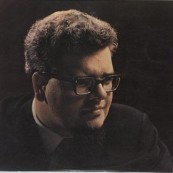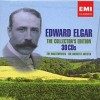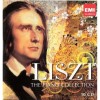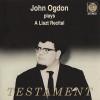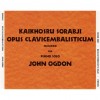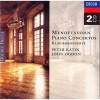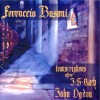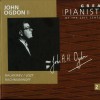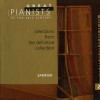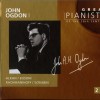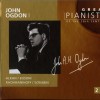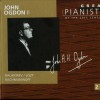| Voice/Instrument: | Pianoforte |
Biography
John Andrew Howard Ogdon (27 January 1937 – 1 August 1989) was an English pianist and composer.
Ogdon was born in Mansfield Woodhouse, Nottinghamshire, and attended Manchester Grammar School, before studying at the Royal Northern College of Music between 1953 and 1957, where his fellow students under Richard Hall included Harrison Birtwistle, Alexander Goehr, Elgar Howarth and Peter Maxwell Davies. Together they formed New Music Manchester, a group dedicated to the performances of serial and other modern works. His tutor there was Claud Biggs. As a boy he had studied with Iso Elinson and after leaving college, he further studied with Gordon Green, Denis Matthews, Dame Myra Hess, and Egon Petri — the latter in Basel, Switzerland.
He won first prize at the London Liszt Competition in 1961 and consolidated his growing international reputation by winning another first prize at the International Tchaikovsky Competition in Moscow in 1962, jointly with Vladimir Ashkenazy.
John Ogdon was able to play most pieces at sight and had committed a huge range of pieces to memory. He enjoyed fully using his vast talents, for example wanting to record the complete works for piano of Rachmaninoff (which constitute about 6-full length CDs). He did not record all these works, but those he did record - about half - were released in 2001. He recorded all ten Scriabin sonatas early in his career. Ogdon was also a formidable exponent of the works of Alkan and Busoni. In more familiar repertoire, he revealed deep musical sensibilities, always buttressed by a colossal technique. He also recorded a number of duo-piano works with his wife, Brenda Lucas (aka Brenda Lucas Ogdon).
On 2 February 1969, on British television, he gave the first modern performance of Edward Elgar's Concert Allegro, Op. 46. The piece was never published and the manuscript had long been believed lost, but it came to light in 1968. Ogdon and Diana McVeigh developed a performing version of the piece from Elgar's manuscript, which was full of corrections, crossings out and additions.
His own compositions number more than 200, and include 4 operas, 2 large works for orchestra, 3 cantatas, songs, chamber music, a substantial amount of music for solo piano, and 2 piano concertos, the first of which he recorded. The majority of his music was composed for the piano. These include 50 transcriptions of works by composers as diverse as Stravinsky, Palestrina, Mozart, Satie and Wagner. He also made piano arrangements of songs by Cole Porter, Jerome Kern and George Gershwin. He also wrote sonatas for violin, flute and cello, all unaccompanied. A planned symphony based on the works of Herman Melville, and a comic opera, were left unfinished. The original manuscripts of many of John Ogdon's compositions now reside at the Royal Northern College of Music Library Catalogue.
Ogdon's health was good, and his physical constitution was strong as his wife often recalled in her Biography. A gentle giant, known and loved for his kindness and generosity, he found it hard to say no and was pushed beyond his strength. In 1973 he experienced a severe breakdown. This sometimes changed his gentle giant personality completely. His illness was diagnosed initially as possibly schizophrenia but then changed to manic depression (either was possibly inherited from his father, who committed suicide). Ogdon spent some time in the Maudsley Hospital in London, and in general needed more nursing than it was possible to provide while touring. Nevertheless, he was reported to maintain three hours' practice a day on the hospital's piano.
In 1983, after emerging from hospital, he played at the opening of the Royal Concert Hall in Nottingham. In 1988 he released a five-disc recording of an interpretation of Sorabji's Opus clavicembalisticum, shortly before he died in August 1989 of pneumonia, brought on by undiagnosed diabetes.
The BBC made a film about his life titled Virtuoso, based on his biography written by Brenda Lucas Ogdon. John Ogdon was played by Alfred Molina, who won a Best Actor award from the Royal Television Society for his performance. This production suggested Ogdon's illness was manic depression rather than schizophrenia as he responded to the former treatment better. Brenda Ogdon also recalled being informed that his obsessive music work could be a symptom of the former condition.
His wife wrote a biography of her life with him in 1981, and then updated it in a second edition in 1989 shortly before his death. Currently another is planned by a different author.

